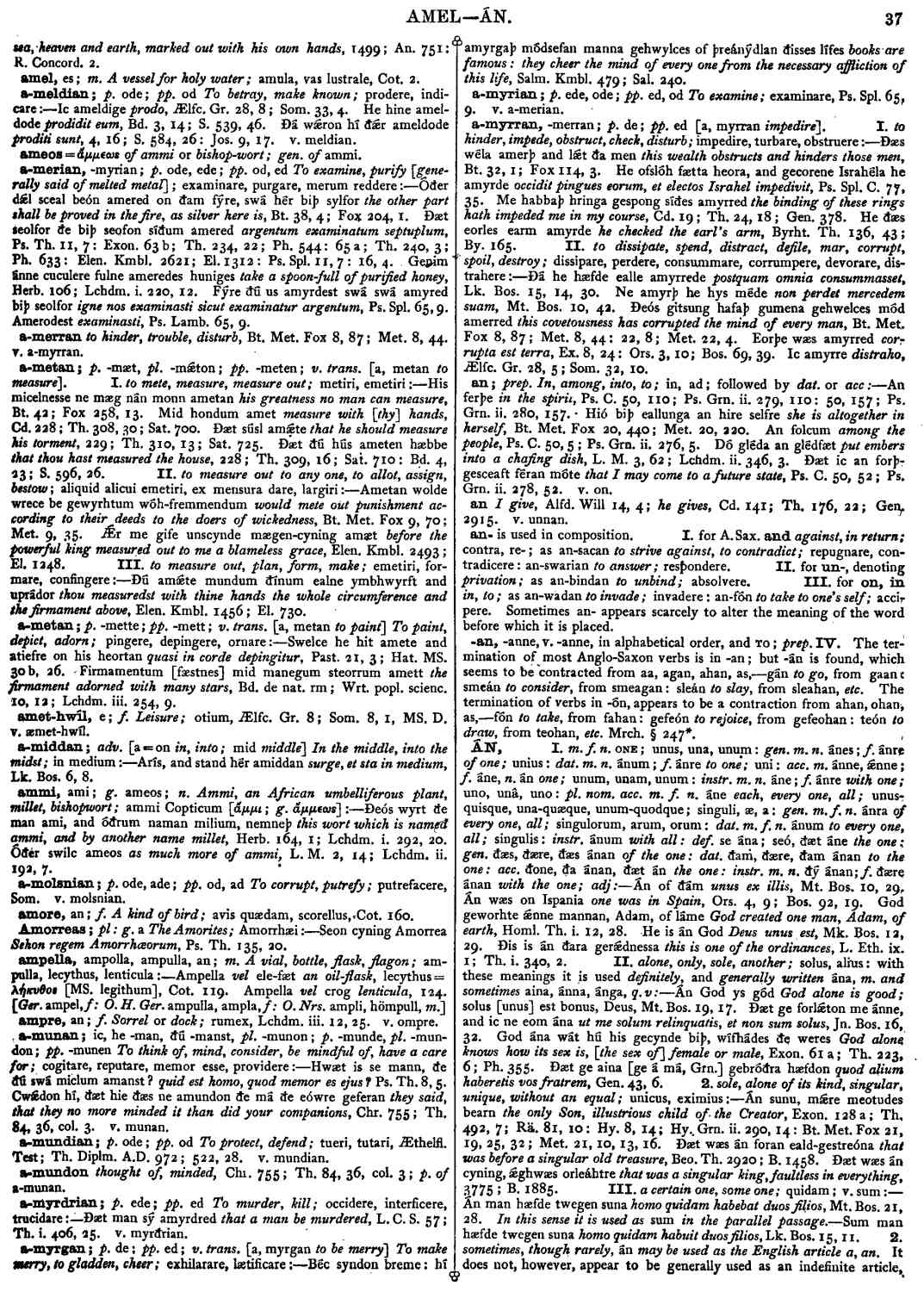ÁN
- noun
- numeral
- adjective
- pronoun
-
Án of ðám
unus ex illis,
- Mt. Bos. 10, 29 .
-
Án wæs on Ispania
one was in Spain,
- Ors. 4, 9; Bos. 92, 19 .
-
God geworhte ǽnne mannan, Adam, of láme
God created one man, Adam, of earth,
- Homl. Th. i. 12, 28 .
-
He is án God
Deus unus est,
- Mk. Bos. 12, 29 .
-
Ðis is án ðara gerǽdnessa
this is one of the ordinances,
- L. Eth. ix. 1; Th. i. 340, 2 .
-
Án God ys gód
God alone is good;
solus [unus] est bonus, Deus,
- Mt. Bos. 19, 17 .
-
Ðæt ge forlǽton me ánne, and ie ne eom ána
ut me solum relinquatis, et non sum solus,
- Jn. Bos. 16, 32 .
-
God ána wát hú his gecynde biþ, wífhádes ðe weres
God alone, knows how its sex is, [the sex of] female or male,
- Exon. 61 a; Th. 223, 6 ;
- Ph. 355 .
-
Ðæt ge aina [ge á má, Grn.] gebróðra hæfdon
quod alium haberetis vos fratrem,
- Gen. 43, 6 .
-
Án sunu, mǽre meotudes bearn
the only Son, illustrious child of the Creator,
- Exon. 128 a; Th. 492, 7 ;
- Rä. 81, 10 :
- Hy. 8, 14 ;
- Hy. Grn. ii. 290, 14 :
- Bt. Met. Fox 21, 19, 25, 32 ;
- Met. 21, 10, 13, 16 .
-
Ðæt wæs án foran eald-gestreóna
that was before a singular old treasure,
- Beo. Th. 2920 ;
- B. 1458 .
-
Ðæt wæs án cyning, ǽghwæs orleáhtre
that was a singular king, faultless in everything,
- 3775 ;
- B. 1885 .
-
Án man hæfde twegen suna
homo quidam habebat duos filios,
- Mt. Bos. 21, 28 .
— Sum man hæfde twegen suna
homo quidam habuit duosfilios,
- Lk. Bos. 15, 11 .
— þeódríc wæs Cristen
Theoderic was a Christian,
- Bt. 1; Fox 2, 7 .
-
Án engel bodade ðám hyrdum ðæs heofonlícan cynínges acennednysse
an angel announced to the shepherds the birth of the heavenly king,
- Homl. Th. i. 38, 3 .
-
Ðár beó án mann stande
there shall be a man standing,
- Chr. 1031; Ing. 206, 5 ;
- Erl. 162, 7 .
-
Ðá stód ðár án Iudeisc wer, ðæs nama wæs Nichodémus
then stood there a Jewish man, whose name was Nicodemus,
- Nicod. 11; Thw. 5, 38 .
-
On ánum reste-dæge on
a rest-day or sabbath,
- Lk. Bos. 24, 1 :
- Jn. Bos. 20, 1 .
-
Sceollon ǽnne tíman gebídan
must wait [abide] a time,
- L. C. E. 18; Th. i. 370, 18 :
- Ors. 3, 7; Bos. 61, 36 .
-
Wirc ðé nú ǽnne arc
now make for thee an ark,
- Gen. 6, 14 .
-
Áne lytle hwíle
a little while,
- Bt. 7, 1; Fox 16, 4 .
-
Cynric ofslógon ǽnne Bryttiscne cyning
Cynric slew a British king,
- Chr. 508; Ing. 21, 6 .
-
Ánra gehwá, ánra gehwylc
every one, or, literally, every one of all.
Swelte ánra gehwilc for his ágenum gilte
unusquisque pro peccato suo morietur,
- Deut. 24, 16 .
-
Ánes hwæt,
- Bt. 18, 3; Fox 64, 30 ,
denotes anything, literally 'anything of all' and is used adverbially for at all, in any degree.
- —
Án æfter ánum
one after another,
- Jn. Bos. 8, 9:
- Salm. Kmbl. 771 ;
- Sal. 385 .
-
To ánum to ánum
from one to the other, only;
duntaxat.
Ðæt án,
orfor án
this one thing, for one thing, only;
tantum-modo,
- Mk. Bos. 5, 36 .
-
Hý forbærndon ánne finger, and ánne
they burnt off one finger, and then another,
- Ors. 2, 3; Bos. 42, 15 .
-
Ete ǽnne and ǽnné
let him eat one and another, one after another,
- Herb. 1, 20; Lchdm. i. 76, 24 .
-
On án
in one, continually, ever,
- Gen. 7, 12 :
- Cd. 140; Th. 175, 9 ;
- Gen. 2892 .
Bosworth, Joseph. “ÁN.” In An Anglo-Saxon Dictionary Online, edited by Thomas Northcote Toller, Christ Sean, and Ondřej Tichy. Prague: Faculty of Arts, Charles University, 2014. https://bosworthtoller.com/1609.
Checked: 1